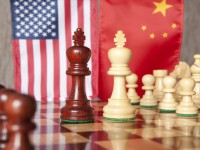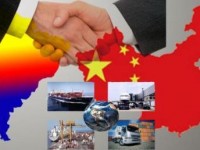Wu Jianmin, Former President, China Foreign Affairs University
Jun 12, 2015
Win-win cooperation has replaced wars and national self-interest, and that approach will make Asia economically stronger and benefit the entire globe.

Fu Ying, Founding Chair of Center for International Security and Strategy, Tsinghua University; China's former Vice Minister of Foreign Affairs
Jun 10, 2015
While Washington has mixed feelings toward China’s rising international status, many American scholars see no convincing reasons for the United States not to support or participate in China’s initiatives like the modern Silk Road and the Asian Infrastructure Investment Bank. That’s a good omen for the concept of “a new type of major country relations,” as proposed by Chinese President Xi Jinping, to avoid confrontation between big powers and to blaze a new trail of mutually beneficial cooperation.

Ted Galen Carpenter, Senior Fellow, Randolph Bourne Institute
Jun 08, 2015
With good reason, Chinese leaders wonder whether the pivot to Asia is the initial stage of a containment policy directed against their country. Similarly, U.S. officials are likely to become concerned about China’s attention and investment in Latin America, not helped by suspicions about China’s intentions in the South China Sea.
Michael Swaine, Senior Associate,Carnegie Endowment for Int'l Peace
Jun 05, 2015
The ongoing dispute threatens to drive U.S.-China relations permanently in a far more adversarial, zero-sum direction and destabilize the region.
Yin Chengde, Research Fellow, China Foundation for International Studies
Jun 04, 2015
Mutual trust is essential for candid exchanges and sincere collaboration. This is an indispensable precondition for China and the U.S. to formulate a new-type major-country relationship and take advantage of historical opportunities such as President Xi’s upcoming U.S. visit.
Stephen Harner, Former US State Department Official
Jun 04, 2015
Contrary to America’s desire to impose universal values on the rest of the world, China’s nationalism does not inform or direct its foreign policy. This is exemplified by the institutional contrasts between the U.S. State Department’s Bureau of Democracy, Human Rights, and Labor and China’s Confucius Institutes.
Chen Jimin, Guest Researcher, Center for Peace and Development Studies, China Association for International Friendly Contact
Jun 02, 2015
The ongoing series of high-level meetings show that, despite pressures from third-party players, Beijing and Washington value a cooperative relationship and mutual understanding that should continue to strengthen.
Zhou Wenzhong, Secretary-General of Boao Forum for Asia
Jun 01, 2015
As China’s economy and interests continue to grow, Beijing will uphold its sovereignty, security and development interests and will assume a bigger role in regional and global affairs. President Xi’s upcoming visit is another opportunity for Americans to appreciate that China’s actions are targeted at the US and its allies.
Zhang Zhixin, Research Professor of Institute of American Studies, CICIR
May 27, 2015
The Secretary of State deepened the understanding between two countries at this critical time, but the chatter around the visit reminds both countries that consensus is easy to reach but hard to actualize. Upcoming high-level meetings, including President Xijping’s September State visit to Washington, provide opportunities to expand that critical understanding.
Su Xiaohui, Deputy Director of Int'l & Strategic Studies, CIIS
May 26, 2015
The maritime issue casts a dark shadow on the cooperation between the two countries in the wake of tenser contests in the South China Sea. It is time to prevent this difference from dominating the bilateral relationship.
Back to Top

- China-US Focus builds trust and understanding between the U.S. and China through open dialogue among thought leaders.
- Our Offerings
- Topics
- Videos
- Podcasts
- Columnists
- Research Reports
- Focus Digest
- Stay Connected
-
Thanks for signing up!
- Get the latest stories from China-US Focus weekly.